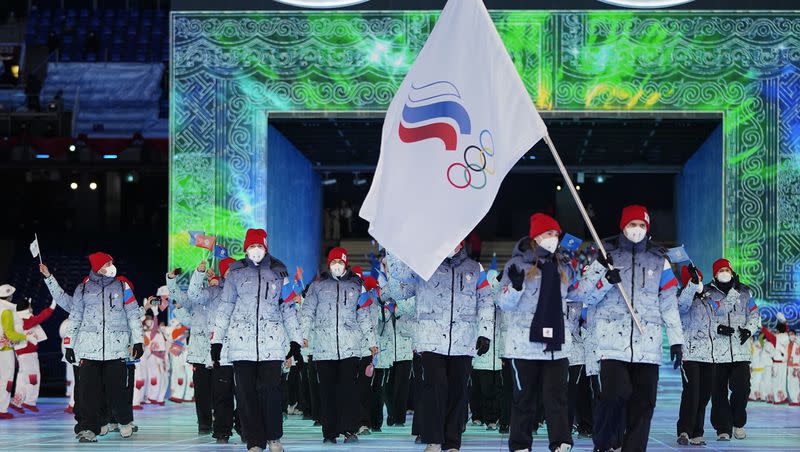The IOC suspended the Russian Olympic Committee. Here’s why

International Olympic Committee leaders suspended Russia’s national Olympic committee Thursday for adding new member organizations from Russian-occupied regions of Ukraine, citing a violation of “territorial integrity.”
The suspension, which took effect immediately and remains in place “until further notice,” prevents Russia from receiving funding from the Olympic movement, according to a statement issued after the start of IOC meetings in India that continue through Monday.
There’s still no decision from the IOC Executive Board, however, on whether Russians and Belarusians will be permitted to participate as neutral athletes in the 2024 Summer Games in Paris or the 2026 Winter Games in Milan-Cortina, Italy.
Related
The IOC meetings are seen as key for Utah’s bid to host another Winter Games in 2030 or, preferably, 2034 because the executive board and then the full membership are expected to consider whether both Olympics should be awarded at the same time.
That didn’t happen Thursday, the IOC’s director of communications, Mark Adams, told reporters, but is on the executive board’s agenda for Friday.
Although IOC leaders aren’t likely to name their preferred Winter Games sites until later this year, agreeing to a dual award would be seen as a “positive signal” for Utah’s bid since the only other contender that’s publicly expressed interest in 2034 is Sapporo, Japan.
Asked about Sapporo dropping out of the race to host in 2030, Adams didn’t mention 2034, but said “there will continue to be some dialogue over the coming years but they’ve obviously made it clear 2030 is too soon for them.”
A decision on Russian and Belarusian athlete participation at the Olympics will come at “the right moment, which will be closer to the Games,” Adams told reporters, indicating the suspension would have no effect on the outcome.
“The technical side of things for the independent athletes is exactly the same” as stated in March, when the IOC spelled out recommendations for athletes from Russia and neighboring Belarus to compete in other international events, he said.
The controversial recommendations allowing Russians and Belarusians that haven’t supported the war to compete without flags or any other national symbols reversed the IOC’s call shortly after Russia invaded Ukraine for them to be banned from competition.
Related
What the IOC says now about Russians competing in the Paris Olympics
IOC pushes back against response to Russians possibly competing in Paris Olympics
Adams said the IOC president has made it clear the recommendations will stay in place, calling them “non-negotiable.” Thursday’s statement from the IOC reiterated it alone will determine if the recommendations apply to the upcoming Olympics.
The IOC Executive Board was reacting to a “unilateral decision” made by the Russian Olympic Committee a week ago to include as members regional sports organizations in the illegally annexed Ukrainian regions of Donetsk, Kherson, Luhansk and Zaporizhzhia.
That’s considered a breach of the Switzerland-based organization’s governing document, the Olympic Charter, the IOC said, “because it violates the territorial integrity” of Ukraine’s national Olympic committee.
There could be additional action against Russia’s Olympic committee. The IOC statement said the executive board “also reserves the right to take any further decision or measure depending on the development of this situation.”
The IOC was criticized by the Russian Olympic Committee for “another counterproductive decision with obvious political motivations,” The Associated Press reported, adding the suspension could be challenged at the Court of Arbitration for Sport in Switzerland.
The Russian Olympic Committee also said it, “as a participant in the international sports movement, reserves the right to protect its own interests, as well as the interests of athletes and organizations of a sovereign country, which we represent in good faith.”
The action against the Russian Olympic Committee comes after months of pushback on the IOC’s recommendations from all sides, including threats of an Olympic boycott from Ukraine and some of its allies.
In June, IOC President Thomas Bach defended the “strict conditions” under which Russians and Belarusians could compete internationally and criticized the Ukrainian government for barring its athletes from some events, a policy that’s since changed.
A month later, Bach intervened on behalf of a Ukrainian fencer disqualified for not shaking the hand of her Russian opponent to grant her a spot at the Paris Olympics, calling it a “unique exception.”

